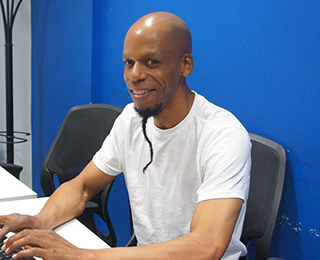
MSc Cyber Security (Part-Time)
Why did you choose to study with Northumbria University London?
I left school at 16 and joined the army. I always wondered whether I should have gone on to sixth form and university, but of course you can’t turn back the clock, and my career has progressed well thus far without a university degree. I have worked in the IT industry for 25 years or so now and have constantly been required to sit exams to gain industry certifications, for which I have always gained a sense of achievement. There has, however, always been those niggling questions, what if I had gone to university? Would my career path have been different? Was I even capable of getting a degree?
QA, my employer, has a partnership with Northumbria University and over recent years we have periodically been offered the opportunity of sponsored enrolment onto the Cyber Security Masters course. I have a colleague, Geraldine Lee, who has completed the course and she recommended it as an opportunity to not only gain the academic qualification but also to apply the knowledge as part of my current job role as an IT instructor. So, when an email came around from QA asking if any of us were interested in joining, I jumped at the chance.
I chose Northumbria University London for 2 reasons really, (1) to prove to myself that I could do it and (2) work-related, the partnership between Northumbria University and QA, the feedback from QA colleagues who had attended previously and the prospect of advancing my career there as a result of completing the course.
How did you find going to university for the first time after years of working?
I didn’t believe I would qualify for the course initially, as the prerequisite for a Masters generally requires an undergraduate degree. However, an alternative for joining this course was relevant industry experience.
Initially I was unsure what to expect and was nervous and out of my comfort zone. As an instructor with over 20 years’ experience of teaching to the IT industry, I was surprised at the difference between work and academic education. It took me a while to realise that the free-flowing, lightly structured format of the modules was typical of academic programmes and intended to promote self-study and critical analysis. There is a blend of people attending the course; people who had just finished their undergraduate degree and others like me with an IT background and doing this alongside their full-time job.
How do you think this course has benefited you and your job?
I personally have found the course to be very beneficial. In the year and a half or so that I have been attending the course I have already applied some of the knowledge gained in my classes, such as highlighting security vulnerabilities and recommending best practices.
On completing the Masters, I hope to focus more on the delivery of security courses. I am currently doing this as I prepare to teach a Practitioners in Cloud Security course. This course is a win-win really; I am developing and answering questions of my abilities and my company is improving the customer experience we provide to delegates through my newly gained knowledge.
How have you found working alongside studying?
IT isn’t just my job – it’s my hobby. Keeping up with current events and technologies is critical in this industry. Before I started this course, I wasn’t going home on weekdays, retiring for the night and watching TV. Even at weekends, I would perhaps give myself one day off and spend the other working.
Instead of switching off I am usually studying for an exam or preparing for a new course. All of this was before the Masters came along. So, when I started this course I suddenly had to find time to do my studying as well. To say it was a challenge is an understatement. I remember working solidly through many nights, fuelled with strong coffee to get assignments completed on time. It is a challenge, but at the end of the day, if you’re not prepared to put the work in, you probably don’t deserve the qualification.
It’s hard work, but it’s worth it. One of the biggest drivers for me at the moment is having my son at university full-time and reminding him that I am studying for a Masters, at my age (52) and whilst working full-time. If I can get a Masters part-time then I am hopeful he can attain his degree full-time. I find that quite a motivator and hope he does too.
What have you enjoyed the most?
I like a challenge, and this course has certainly been that. Tight deadlines for assignment submissions is challenging but I actually thrive in these situations and get a great sense of satisfaction when work is submitted and marked.
I would also say that we have had a good social life and I have made some good friends along the way. We all keep in contact through our WhatsApp Group, ‘The London Cocktail Club.’
What would you recommend to someone considering this programme?
I would ask them to consider the questions; why are you doing this? What do you hope to gain from it?
Anyone considering the course needs to think about whether they have the time necessary. I’m fortunate that my children are grown up so I can focus on myself a bit more. It might prove very challenging for someone who has to factor in home life, work and a part-time Masters, but it is definitely worth it.
As long as you understand what you’re letting yourself in for and you envisage a benefit from achieving the Masters then the course will be worthwhile.

“The programme has not only given me knowledge and skills, but also the confidence I need to pursue my future plans.”